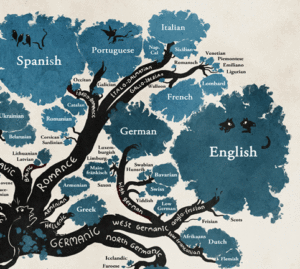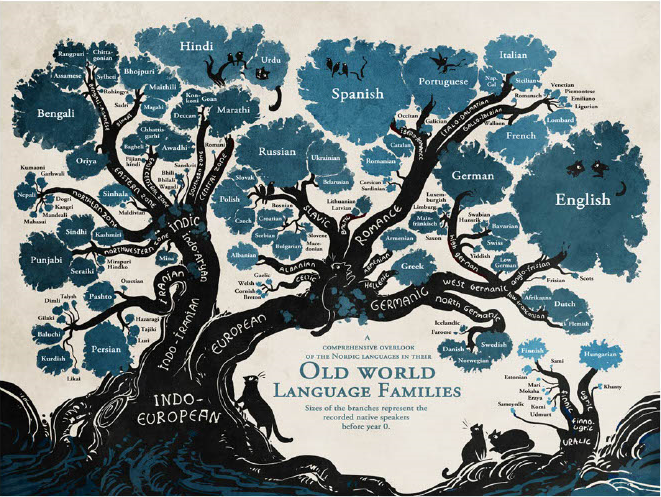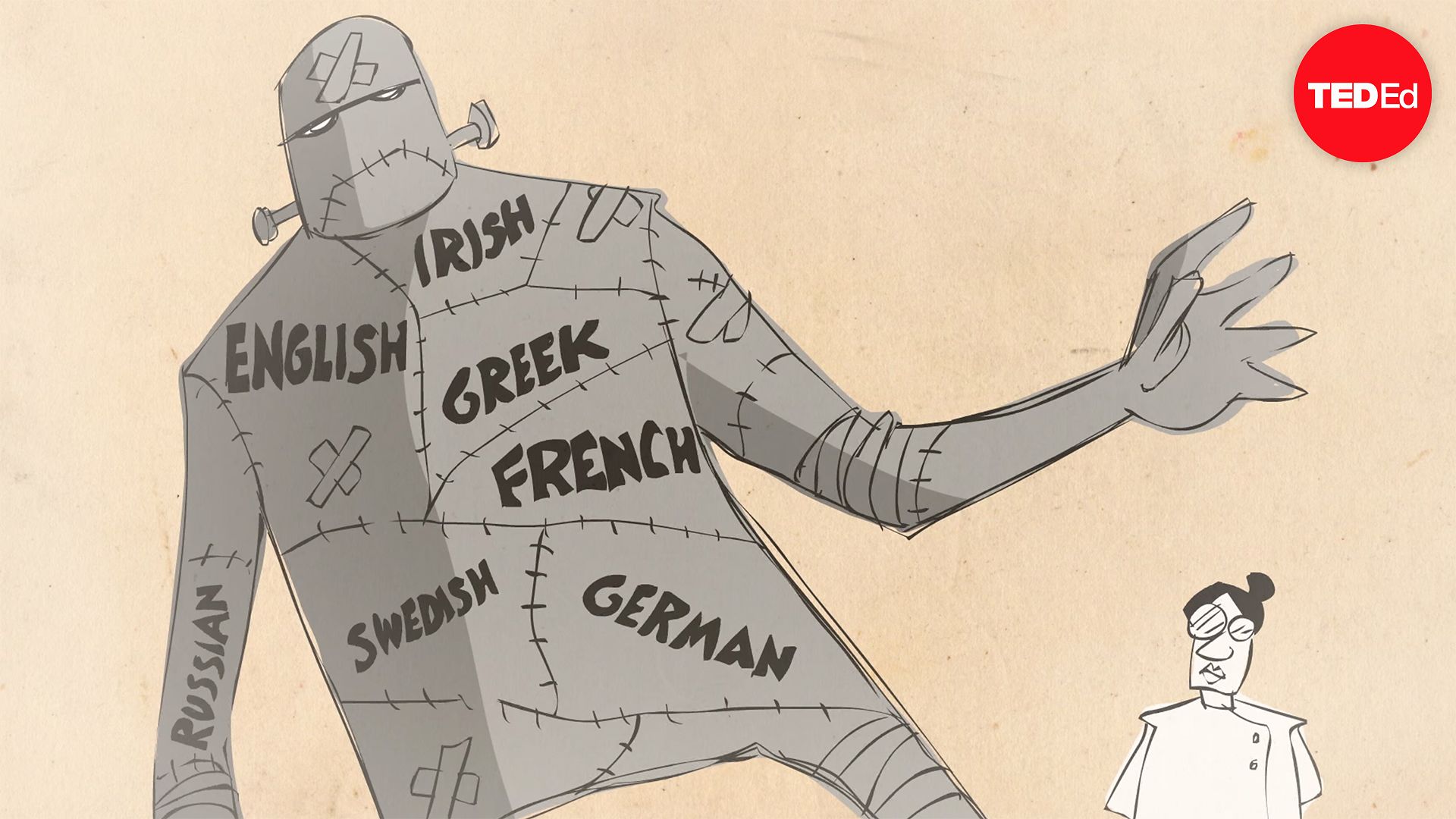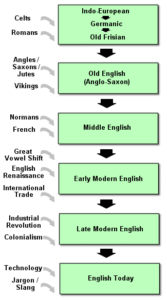The English alphabet is based on the Latin script, just like French and Spanish, which also originated from Latin. However, English and French are considered completely different languages with distinct roots. While French and Spanish belong to the Ibero-Romance language group, evolving from Latin, English has its roots in the Germanic family, akin to German.

<출처: Acutrans, https://acutrans.com/the-history-of-the-english-language/>
Digging deeper, both English and French belong to the Indo-European language family, classified akin to branches on a linguistic family tree. Linguists use this analogy to demonstrate the close relationship between these languages. All Indo-European languages trace back to a common ancestral language. Linguists posit that this language diverged into Indo-European and European branches, with the latter further evolving into modern languages like Italic, Slavic, and Germanic.
In the Italic branch, there’s Ukrainian, Polish, Russian, while Spanish, Italian, and French fall under the Romance languages. In the Germanic family, there’s German, Danish, Norwegian, and English.

The early form of English emerged around the 5th century when three Germanic tribes sailed to Britain in search of new land, interacting with the locals called the Anglo-Saxons. The blend of these groups led to the development of Old English, which underwent rapid changes with each conquest or reign in Britain.
Notably, Vikings, using Old Norse, invaded in the 9th century, followed by the Normans in 1066. William the Conqueror brought Old French influence, introducing many French words into English. This historical mingling has led to occasional confusion about the shared roots of French and English.
<출처: https://www.thehistoryofenglish.com/english-language-history>
- Before English (Prehistory – c. 500AD) (including Indo-European, Spread of Indo-European Languages, Germanic, The Celts, The Romans)
- Old English (c. 500 – c. 1100) (including Invasions of Germanic Tribes, The Coming of Christianity and Literacy, The Anglo-Saxon or Old English Language, The Vikings, Old English after the Vikings)
- Middle English (c. 1100 – c. 1500) (including Norman Conquest, French (Anglo-Norman) Influence, Middle English After the Normans, Resurgence of English, Chaucer and the Birth of English Literature)
- Early Modern English (c. 1500 – c. 1800) (including Great Vowel Shift, The English Renaissance, Printing Press and Standardization, The Bible, Dictionaries and Grammars, Golden Age of English Literature, William Shakespeare, International Trade)
- Late Modern English (c. 1800 – Present) (including The Industrial and Scientific Revolution,Colonialism and the British Empire, The New World, American Dialect, Black English, Britain’s Other Colonies, Language Reform, Later Developments, 20th Century)
- English Today (including Who Speaks English?, English as a Lingua Franca, Reverse Loanwords, Modern English Vocabulary, Modern English Spelling)
It’s essential to note that Roman letters weren’t initially used in English. The early residents of Britain, speaking a Germanic dialect called Anglo-Saxon, used the runic alphabet, like other Germanic languages in Northern Europe. The integration of Roman letters came with Christian missionaries who brought Christianity and the Roman script to Britain.
The origin of this alphabet can be traced back to the Phoenician script, which influenced the formation of the Greek alphabet. It is noteworthy that the Phoenician alphabet initially consisted only of consonants. The Greeks introduced vowels, using α (alpha), ε (epsilon), η (eta), ι (iota), ο (omicron), and thus, the first alphabet, the Greek alphabet, was created.
The Etruscans, who learned the Greek alphabet, adapted it to suit their language and passed it on to the Latin people, resulting in the formation of the Latin script.
This alphabet made its way to Britain, encountering the English language, eventually evolving into the contemporary English script and language we know today.

오늘날 영어의 알파벳은 로마 문자이고 따라서 영어도 불어나 스페인어처럼 라틴어에서 나왔겠 거니 했습니다. 그런데 영어와 불어는 전혀 뿌리가 다른 언어라고 합니다. 사실 영어와 불어는 전혀 다른 언어입니다. 불어와 스페인어는 모두 이베리아 로망스어군에 속하는 언어로, 라틴어에서 분화되었고, 반면 영어는 독일어와 같은 계통으로 게르만어에 뿌리를 두고 있습니다.
뿌리족으로 더 내려가면 불어와 영어 모두 인도-유럽어족의 일부입니다. 동물들과 마찬가지로 언어도 가족별로 분류됩니다. 이들은 가지 친 나무로도 표현될 수 있습니다. 학자들은 이러한 표현을 사용하여 두 언어가 얼마나 밀접하게 관련되어 있는지를 보여줍니다.
모든 인도-유럽어는 하나의 원시 언어로 시작되었습니다. 언어학자들은 이 언어가 분리되어 인도어와 유럽어가 나뉘고, 유럽어는 다시 오늘날 우리가 알고 있는 발토-슬라브어, 이탈리아어, 게르만어로 분화됩니다.
발토-슬라브어어 가지에는 우크라이나어, 폴란드어, 러시아어 그리고 이탈리아어에는 스페인어, 이탈리아어, 프랑스어가 포함되고, 게르만 가족에는 독일어, 덴마크어, 노르웨이어, 그리고 영어가 있습니다.
영어의 매우 초기 형태는 5세기 경에 시작되었습니다. 세 개의 게르만 부족이 신규 토지를 찾아 영국으로 항해했습니다. 이 세 부족은 섬의 주민인 엔글로이 불리는 사람들과 접촉했습니다. 엔글로이는 켈틱의 한 버전을 사용했습니다. 곧, 부족들이 섞이면서 고대 영어가 발전했습니다. 한 번 고대 영어가 정착하면서 그것은 빠르게 변하기 시작했습니다. 각각의 다른 부족이나 왕이 영국을 정복할 때마다 영어가 변했습니다. 먼저 9세기에는 바이킹들이 상륙했습니다. 바이킹들은 덴마크에서 왔고 노르스어를 사용했습니다. 그 후에 노르만인들이 침략했습니다. 노르만인들은 현대 프랑스 지역의 지배자들이었습니다. 1066년에 윌리엄 정복자가 침략하여 영국에 오래된 프랑스어를 가져왔습니다. 이로 인해 많은 프랑스어 단어가 영어에 편입되었습니다. 불어와 영어가 한 뿌리라고 혼동할 수 있는 사건이 일어난 것입니다.

고대 영어 (기원 500년경 – 기원 1100년경): 게르만족의 침략, 기독교와 문화의 도래, 영국 소속의 구 영어 언어, 바이킹들, 바이킹들 이후의 고대 영어
중세 영어 (기원 1100년경 – 기원 1500년경): 노르만 정복, 프랑스 (앵글로-노르만) 영향, 영어 문학의 탄생
조기 현대 영어 (기원 1500년경 – 기원 1800년경): 대모음 변화(Great Vowel Shift), 영어 르네상스, 인쇄기와 표준화, 성경, 사전과 문법서, 영어 문학의 황금 시대, 윌리엄 셰익스피어
후기 현대 영어 (기원 1800년경 – 현재): 산업 및 과학 혁명, 식민지주의와 대영제국, 미국의 방언, 블랙 영어, 영국의 다른 식민지 영어
<출처:https://www.thehistoryofenglish.com/>
그렇다면 이 중세 영어가 오늘날 알파벳을 사용하게 된 것은 언제 일까요? 그러니까 로마 글자가 처음부터 영어에 사용된 것은 아니라는 이야기입니다. 처음 영국의 거주자들이 사용했던 독일어 방언 앵글로-색슨어는 다른 북부 유럽의 다양한 게르만어 사용자과 마찬가지로 룬 문자(Runes; runic alphabet)를 사용하여 말을 기록하였습니다. 그러다 기독교 선교사들이 영국의 섬에 기독교와 함께 로마 문자를 가지고 와 영어에 접목한 것입니다. 대략 8세기 경 이야기입니다.
반면 영어의 글자 즉 알파벳의 기원을 짧게 살펴보면 이렇습니다. 오늘날 영어가 차용한 알파벳은 기원전 5세기에 제국 로마에서 파생된 라틴 알파벳을 기반으로 하며, 이 다시 고대 그리스 알파벳에서 파생되었습니다. 이 알파벳의 기원은 페니키아 문자이며, 이 문자는 그리스 문자의 형성에 영향을 주었습니다. 이 페니키아 알파벳에는 자음밖에 존재하지 않았다는 점에 주목해야 합니다. 모음을 만들어 낸 사람들은 그리스인들이었고, 그리스인들이 α(alpha), ε(epsilon), η(eta), ι(iota), ο(omicron)로 사용하게 되었고, 이로써 최초의 알파벳인 그리스 문자가 만들어졌습니다.
이 그리스 문자를 배운 에트루리아인들은 이를 자신들에게 알맞게 변형하여 사용하고 라틴족에게 전해주게 되는데 이것이 로마자(라틴 문자)가 된 것입니다.
이 알파벳 글자가 영국으로 들어가 영어라는 말을 만났고 그렇게 오늘날 영어라는 글자와 말로 발전했다고 요약 정리할 수 있습니다.

답글 남기기